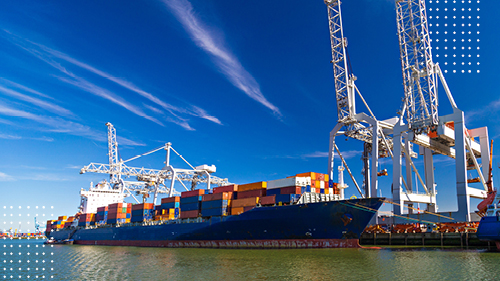Freight Forwarder vs Customs Broker: What’s the Difference?
08/25/2021

Global supply chains are incredibly complex networks that require involvement by various professionals who must execute different tasks. Two of the most important parties involved in an international shipment are the freight forwarder and the customs broker. One company is often both the freight forwarder and the customs broker; however, the two can be independent of each other due to the differences in responsibilities and capabilities.
What does a freight forwarder do?
Freight forwarders are supply chain experts who focus on the logistics and transportation of an international business transaction.
Forwarders act as intermediaries who arrange for cargo to travel from an origin to a destination within a specific time frame. Essentially, freight forwarders arrange and monitor all fine details so that shipments flow across international borders with compliance and efficiency, mitigating delays.
Freight forwarding companies can contract directly with carriers or utilize a client’s negotiated contract to secure bookings via ocean, air, rail or truck. Once a shipment is ready to go, whether import or export, the shipper/consignee will send basic details to the freight forwarder, who will then make the booking with the carrier.
Freight forwarders advise shippers of estimated freight costs, port charges, costs of particular documents, insurance costs and terminal handling fees. Freight forwarders can also assist companies with initial pickup (depending on the Incoterm), interim storage, and freight consolidation.
The freight forwarder is responsible for several export formalities, which in the United States include Schedule B classifications, Shipper’s Letter of Instruction (SLI), Automated Export System (AES) filings, Export Licenses, Foreign Standards and Certifications as well as Denied Party Screenings.
What does a customs broker do?
Customs brokers are international trade experts responsible for preparing and clearing a customs entry upon shipment arrival to a port of entry (or technically up to five days before the vessel docks for ocean freight and upon take-off of the final flight into the U.S. for airfreight).
Customs brokers are also referred to as Licensed Customs Brokers (LCBs) if they have completed the extensive examination and application process with U.S. Customs and Border Protection (CBP).
Fun Fact – The LCB exam pass rate is less than the bar (law) exam!
Due to the complexity of importing goods into the United States, many importers hire customs brokers to help clear U.S. import shipments. Individuals can self-clear goods for their own account, but corporations, partnerships and associations rely on licensed brokers to navigate the various facets of “customs business.”
According to 19CFR 111.1, the term “customs business” means those activities involving transactions with U.S. Customs and Border Protection (CBP) concerning the entry and admissibility of merchandise, its classification and valuation, the payment of duties, taxes or other charges assessed or collected by U.S. Customs and Border Protection upon merchandise by reason of its importation, or the refund, rebate or drawback thereof.
It also includes the preparation of documents or forms in any format and the electronic transmission of documents, invoices, bills, or parts thereof, intended to be filed with U.S. Customs and Border Protection (CBP) in furtherance of such activities, whether or not signed or filed by the preparer, or activities relating to such preparation, but does not include the mere electronic transmission of data received for transmission to Customs.
No person may conduct customs business (other than solely on behalf of that person) unless that person holds a valid customs broker’s license issued by the Secretary.
Customs brokers can also help shippers with:
- Importer Security Filings (ISF)
- Classification of Goods (The HTSUS – Harmonized Tariff System of U.S. – is very complex and often overwhelming for new shippers)
- Calculation of Duties, Taxes and Fees
- Dispatching for Final Delivery
- Coordination of Customs Exams
- Customs Bonds
- Duty Drawback
- Reconciliation
- Liaison between the importer and various government agencies such as U.S. Customs Border and Protection, U.S. Department of Agriculture, U.S. Consumer Product Safety Commission, U.S. Federal and Drug Administration, etc.
Advantages of a combined customs broker and freight forwarder
Hiring a company that is both a freight forwarder and a customs broker can make the import and export process convenient and seamless due to its ability to provide door-to-door service. This includes securing the transportation space, gathering necessary paperwork, clearing the goods and arranging the final delivery.
An international logistics partner that is both a freight forwarder and customs broker can also help importers and exporters make intelligent routing and mode selections to produce the most economical solutions that meet the delivery time frame. Additionally, a freight forwarder and customs broker combo can help an importer or exporter understand and select an optimal Incoterm based on the desired amount of risk and responsibility.
Choose Ascent for seamless international logistics
Ascent Global Logistics offers comprehensive solutions for all your freight forwarding and customs brokerage needs. Our international transportation and trade experts simplify supply chain management by providing customized solutions, premium customer service, and state-of-the-art technology. With expertise across all modes of transportation and a keen understanding of current industry impacts, we deliver creative shipping solutions that help our customers succeed, even in the most complicated circumstances.
Learn more about our freight forwarding and customs brokerage services and experience the Ascent Global Logistics difference.
January 27, 2025
Navigating Chinese New Year Shipping Delays
December 9, 2024
Thank you for contacting Ascent!
A member of our team will be in contact within a few business hours.
Okay